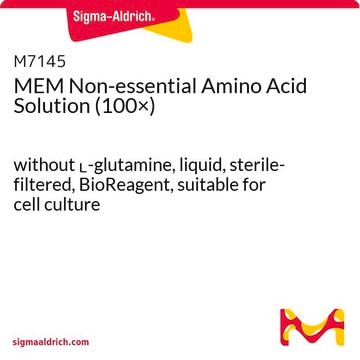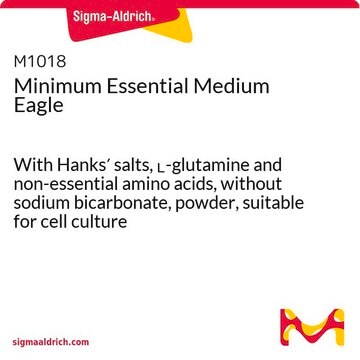M2645
Minimum Essential Medium Eagle
HEPES modification, with Earle′s salts and ʟ-glutamine, without sodium bicarbonate, powder, suitable for cell culture
Synonym(s):
EMEM, MEM
About This Item
Recommended Products
product name
Minimum Essential Medium Eagle, HEPES Modification, with Earle′s salts, L-glutamine and 25 mM HEPES, without sodium bicarbonate, powder, suitable for cell culture
form
powder
technique(s)
cell culture | mammalian: suitable
components
HEPES: 25 mM
phenol red: yes
L-glutamine: yes
NaHCO3: no
sodium pyruvate: no
Earle’s salts (5% CO2): yes
shipped in
ambient
storage temp.
2-8°C
Looking for similar products? Visit Product Comparison Guide
Quantity
Reconstitution
Other Notes
also commonly purchased with this product
Storage Class Code
11 - Combustible Solids
WGK
WGK 1
Flash Point(F)
Not applicable
Flash Point(C)
Not applicable
Certificates of Analysis (COA)
Search for Certificates of Analysis (COA) by entering the products Lot/Batch Number. Lot and Batch Numbers can be found on a product’s label following the words ‘Lot’ or ‘Batch’.
Already Own This Product?
Find documentation for the products that you have recently purchased in the Document Library.
Customers Also Viewed
Articles
A large selection of MEM formulations. Minimum Essential Medium (MEM), developed by Harry Eagle, is one of the most widely used of all synthetic cell culture media.
A large selection of MEM formulations. Minimum Essential Medium (MEM), developed by Harry Eagle, is one of the most widely used of all synthetic cell culture media.
A large selection of MEM formulations. Minimum Essential Medium (MEM), developed by Harry Eagle, is one of the most widely used of all synthetic cell culture media.
A large selection of MEM formulations. Minimum Essential Medium (MEM), developed by Harry Eagle, is one of the most widely used of all synthetic cell culture media.
Protocols
Powdered media and salt mixtures are extremely hygroscopic and should be protected from atmospheric moisture.
Our team of scientists has experience in all areas of research including Life Science, Material Science, Chemical Synthesis, Chromatography, Analytical and many others.
Contact Technical Service



